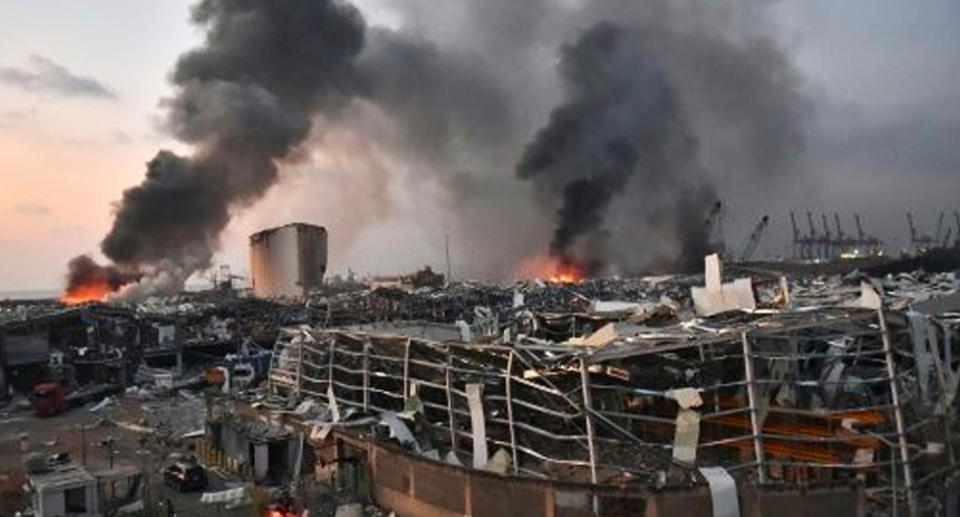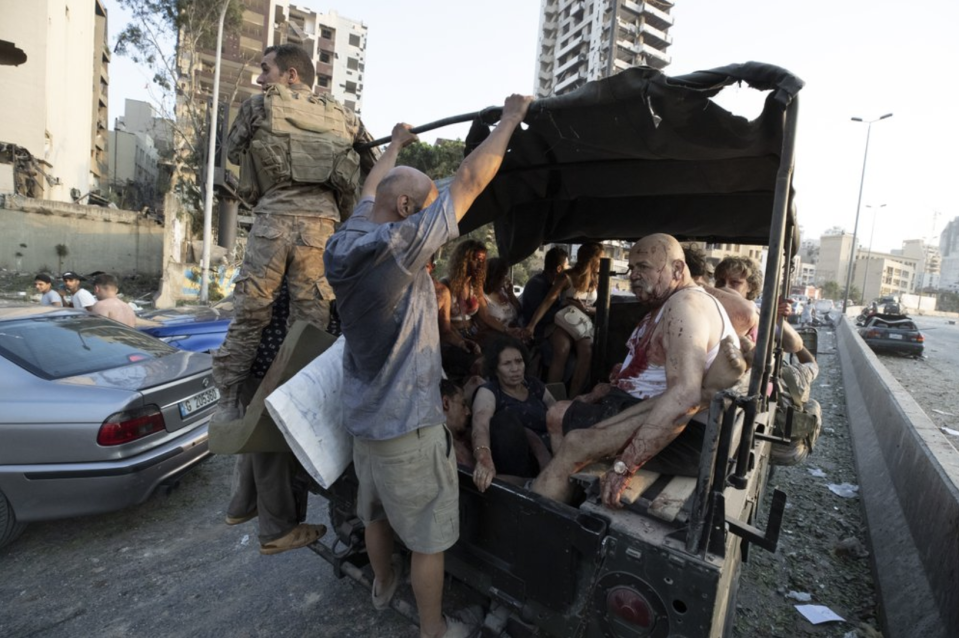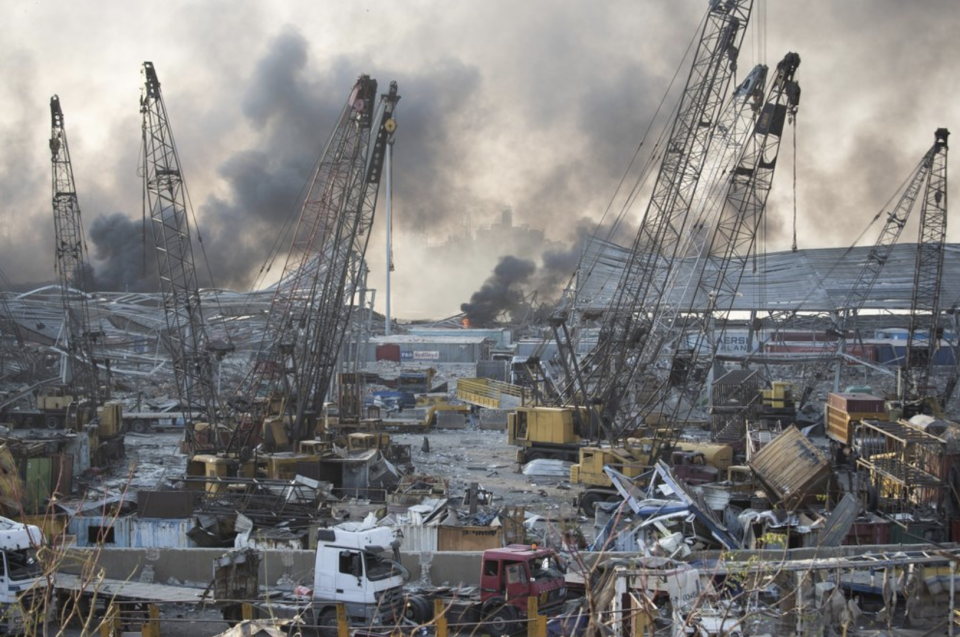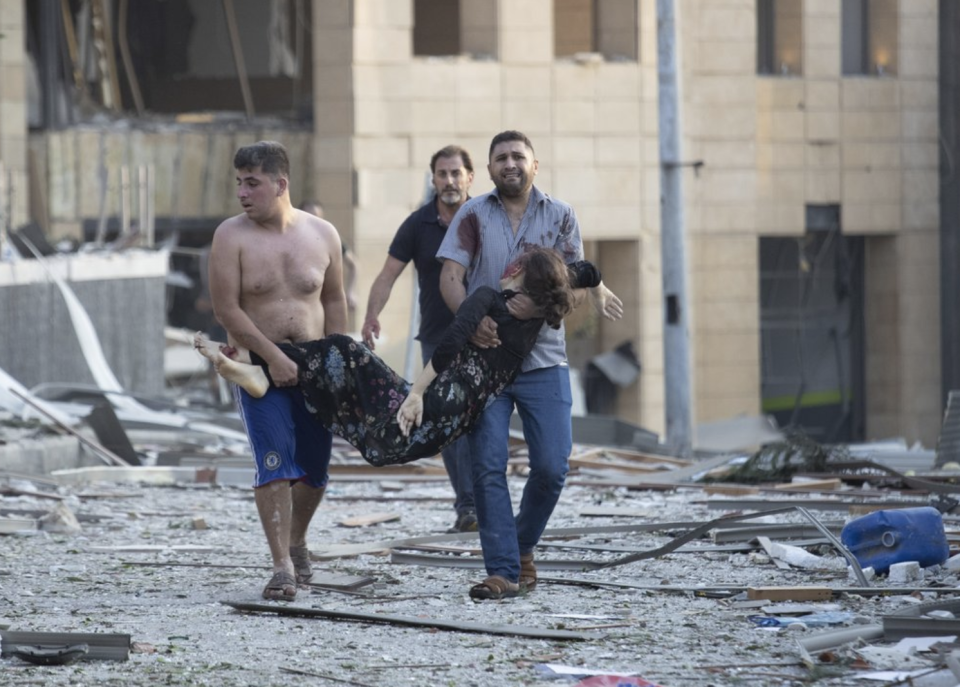Beirut explosion: At least 70 people killed in 'real horror show'
WARNING – DISTRESSING AND GRAPHIC CONTENT: An Australian is among scores of people killed after a massive explosion rocked Lebanon’s capital Beirut on Tuesday.
The giant blast flattened much of the port, damaging buildings across the capital and sending a giant mushroom cloud into the sky.
At least 78 people were killed and 3,700 injured, with bodies buried in the rubble, Lebanon’s Health Minister Hamad Hasan said.
Hours later, ambulances still carried away the wounded as army helicopters helped battle fires raging at the port.
The sudden devastation overwhelmed a country already struggling with both the coronavirus pandemic and an economic crisis: Beirut hospitals quickly filled beyond capacity, pleading for blood supplies and generators to keep their lights on.
The cause of the blast – which sparked fires, overturned cars, and blew out windows and doors – was not immediately known.

Australian Prime Minister Scott Morrison told Channel Nine’s Today show on Wednesday morning one Australian is known to have died in the blast.
“There's about 20,000 Australians at any one time who are in Lebanon and it's my deep regret to inform you that one Australian has been killed in this horrific blast,” he said.
“Our hearts go out to all of those in Lebanon and in Beirut in particular at the moment. You can see from the image of the blast it is just absolutely devastating.”
Mr Morrison said Australia’s Beirut embassy has been “impacted significantly” and staff at the facility have suffered minor injuries.
Foreign Affairs Minister Marise Payne told ABC News 95 per cent of the windows in the embassy had shattered, with staff suffering glass-related injuries.
Mr Morrison said anyone from the Lebanese community in Australia concerned over the welfare of relatives in Beirut can call the Department of Foreign Affairs and Trade on 02 6261 3305.

Video shows moment orange mushroom cloud shoots into air
Abbas Ibrahim, chief of Lebanese General Security, said it might have been caused by highly explosive material that was confiscated from a ship some time ago and stored at the port. Local television channel LBC said the material was sodium nitrate.
Witnesses reported seeing a strange orange-coloured cloud over the site after the explosion. Orange clouds of toxic nitrogen dioxide gas often accompany an explosion involving nitrates.
Terrifying video from a nearby high-rise building shows the explosion erupt, sending a bright orange cloud into the sky before a blast wave engulfs the surrounding buildings.
The person filming appears to be sent flying inside their building amid smoke and debris before the camera pans again to the thick orange cloud now engulfing the skyline.
"It was like an atomic bomb," Makrouhie Yerganian, a retired schoolteacher in her mid-70s who has lived near the port for decades, told AFP.
"I've experienced everything, but nothing like this before," even during the country's 1975-1990 civil war.”
An Israeli government official said Israel “had nothing to do” with the blast. He spoke on condition of anonymity because he was not authorised to discuss the matter with the media. Israeli officials usually do not comment on “foreign reports”.
BREAKING - A UNIFIL Maritime Task Force ship has been damaged following today's explosion in #Beirut port; leaving some naval 'peacekeepers' critically injured; Faytuks #LebanonExplosion
pic.twitter.com/IUDPRJ3Oli— SV News 🚨 (@SVNewsAlerts) August 4, 2020
Terrifying video from a guy driving his car while filming the Beirut explosion...pic.twitter.com/0XpfqCw22L
— Rex Chapman🏇🏼 (@RexChapman) August 4, 2020
‘A real horror show’
The blast was stunning even for a city that has seen civil war, suicide bombings and bombardment by Israel. It could be heard and felt as far away as Cyprus, more than 200km across the Mediterranean.
“It was a real horror show. I haven’t seen anything like that since the days of the (civil) war,” Marwan Ramadan, who was about 500 metres from the port and was knocked off his feet by the force of the explosion, said.
Emergency teams streamed in from across Lebanon to help and the injured had to be taken to hospitals outside the capital. Mr Hamad added hospitals were barely coping and offers of aid were pouring in from Arab states and friends of Lebanon.

Some of those injured lay on the ground at the port, Associated Press staff at the scene said. A civil defence official said there were still bodies inside the port, many under debris.
Beirut’s governor Marwan Abboud broke into tears as he toured the site, saying: “Beirut is a devastated city.”
An AFP reporter in the city told ABC News the blast was felt right across Lebanon.
“There were a lot of hospitals that were damaged so basically if you want to take victims or wounded people to the hospitals, they are full. People are piled up on the floors. It's like being in movie,” she said.
Initially, video taken by residents showed a fire raging at the port, sending up a giant column of smoke, illuminated by flashes of what appear to be fireworks. Local TV stations reported a fireworks warehouse was involved.
The fire then appeared to catch at a nearby building, triggering a more massive explosion, sending up a mushroom cloud and a shock wave.
Charbel Haj, who works at the port, said it started as small explosions like firecrackers. Then, he said, he was thrown off his feet by the huge blast. His clothes were torn.

Explosion felt miles away
Miles from the port, building facades were shredded, balconies were knocked down and windows shattered. Streets were covered with glass and bricks and lined with wrecked cars. Motorcyclists picked their way through traffic, carrying the injured.
One woman covered in blood from the waist up walked down a trashed street while talking furiously on her phone. On another street, a woman with a bloodied face looked distraught, staggering through traffic with two friends at her side.
“This country is cursed,” a young man passing by muttered.
The blast came at a time when Lebanon’s economy is facing collapse from the financial crisis and the coronavirus restrictions. Many have lost jobs, while the worth of their savings has evaporated as the currency has plunged in value against the dollar. The result has thrown many into poverty.

It also occurred amid rising tensions between Israel and the militant Hezbollah group along Lebanon’s southern border.
The explosion was reminiscent of massive blasts during Lebanon’s civil war and took place only three days before a UN-backed tribunal was set to give its verdict in the killing of former prime minister Rafik Hariri in a truck bombing more than 15 years ago. That explosion, with a ton of explosives, was felt miles away, just like Tuesday’s explosion.
Several of Beirut’s hospitals were damaged in the blast. Roum Hospital put out a call for people to bring it spare generators to keep its electricity going as it evacuated patients because of heavy damage.
Outside the St George University Hospital in Beirut’s Achrafieh neighbourhood, people with various injuries arrived in ambulances, in cars and on foot.
The explosion had caused major damage inside the building and knocked out the electricity at the hospital.
Dozens of injured were being treated on the spot on the street outside, on stretchers and wheelchairs.
“This is a catastrophe we have on our hands,” one doctor, speaking on condition of anonymity because he was not authorised to make press statements, said.
with AP
Do you have a story tip? Email: newsroomau@yahoonews.com.
You can also follow us on Facebook, Instagram and Twitter and download the Yahoo News app from the App Store or Google Play.




